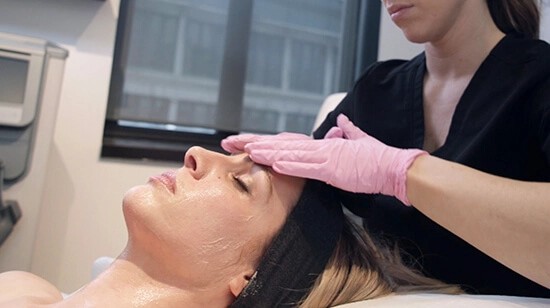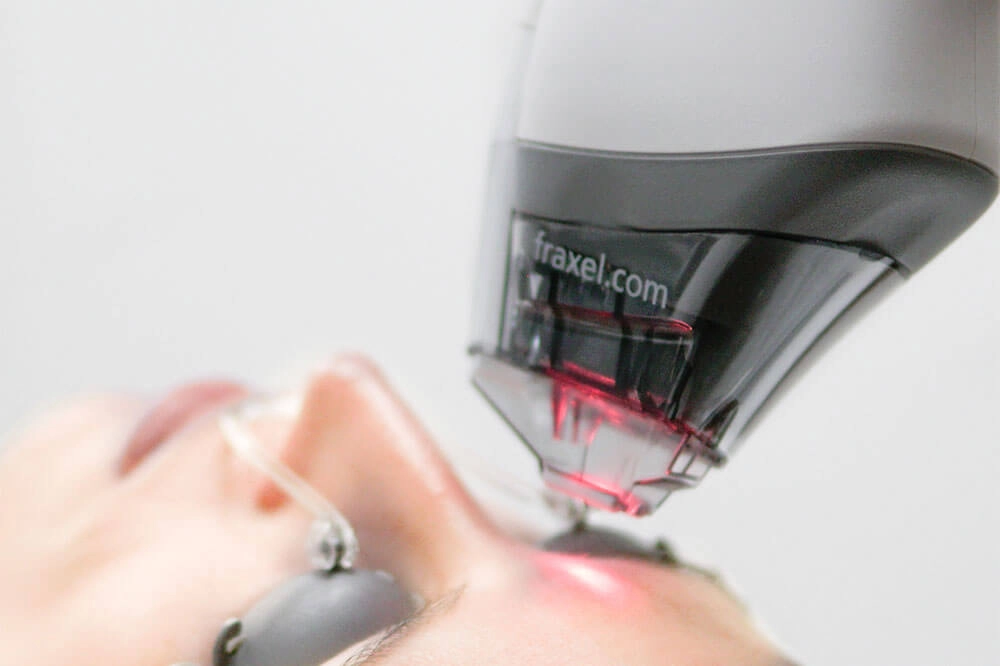
Uncover smoother, healthier skin with fractional laser resurfacing at our South Surrey clinic. This innovative treatment stimulates natural healing, promoting collagen production and reducing the appearance of fine lines, scars, and pigmentation.
Our experienced team works with you to create a customized plan that addresses your specific needs, ensuring effective and long-lasting results. Trust us to provide expert care in a supportive environment.

Fractional lasers offer a cutting-edge solution for revealing radiant skin and reducing stretch marks, acne scars, age spots, and freckles. Grounded in our commitment to enhancing natural beauty, our team of experienced physicians, nurses and skin experts tailors each fractional laser treatment to your unique circumstances.
Outcomes can vary for each patient. Images provided are illustrative only and do not guarantee specific results.
Desensitizing the skin with a lidocaine-based anesthetic gel will reduce discomfort felt during treatment. This product is applied to and left on clean skin for approximately 1 hour before treatment to temporarily desensitize the treatment area.
Carefully removing all traces of gel, makeup and lipid film is an essential first step in your fractional laser treatment. It is also important to properly disinfect the skin using alcohol to create a suitable sterile surface before the start of the procedure.
Depending on the technology used, protective eyewear may be required to properly protect your eyes from possible light emissions. Your eye protection ensures complete safety at all times.
Determining the specific parameters for the treatment will ensure its success. Since each individual is unique, each condition must be treated differently depending on the area to be treated, the surface and outline of blemishes to be corrected, and skin type. Staff should consider several factors that are unique to you and that may change over time. Deep acne scars or stretchmarks will probably require more work than a simple pass over superficial freckles. The good news is that once your skin has regenerated, the results will remain with you for the rest of your life.
Feeling the applicator tip sliding over your skin can be relatively uncomfortable. By their very nature, fractional lasers are reasonably invasive treatments that sometimes cause a strong heat/burning sensation. Depending on the technology used, several passes may—or may not—be required on the same area and, given the depths attained in some cases, bleeding may also occur (especially during CO2 and ProFractional lasers). The session rarely exceeds 60 minutes and our experienced medical and technical personnel make every effort to minimize discomfort and accompany you throughout the treatment.
Applying a specific cream immediately after the treatment is not always necessary; each technology requires different follow-up and post-treatment procedures that are carefully explained to the patient by our medical and technical team. These recommendations must be strictly followed to allow the skin to recover properly. Swelling, redness, and sometimes even bleeding can be expected during the first 48 hours; these symptoms decrease significantly in 5 to 10 days. Normal skin flaking/peeling occurs at the end of recovery and it is imperative that you avoid sunlight, makeup and all scented products until your skin has fully healed.
Treatment prices vary based on your individual needs and the specific procedure performed. To learn more about pricing, we invite you to contact your clinic or schedule a consultation with our experts.

It normally takes 2 to 5 sessions at a minimum one-month interval to achieve optimal results, depending on the initial condition of your skin. However, it is strongly recommended to maintain the overall health of the epidermis using glycolic peels occasionally, or as part of a course of treatment, based on your technician’s recommendations. Skin treated by fractional laser is not exempt from the natural aging process! Other parts of the body can benefit from Venus Freeze sessions.
Pregnant or breastfeeding women should delay this type of treatment. Some treatments for severe acne – received within the last 6 months – may also be a contraindication.
For both men and women, the face is unquestionably the most popular treatment area for fractional laser. It is, after all, one of the body’s most exposed areas and is conducive to irregular pigmentation and texture. Full or partial face treatments are possible, with the latter option being especially effective on acne scars that are concentrated on the cheeks and forehead. Treatments can also be performed on various body areas. Non-ablative lasers are ideal for the treatment of stretchmarks on the stomach and thighs, for pigment spots on the hands, and for loose, sagging skin on the décolleté. It is important to consult with our team prior to treatment to openly discuss your goals and expectations. It is equally important to assess the various treatment options, the number of sessions required, and the benefits and risks associated with each procedure.

Shop our products for an enhanced beauty routine!
Visit The Online Store101 – 15850 26 Avenue South Surrey, BC V3Z 2N6
Phone
604 560-8040
Monday
9:00 AM - 5:00 PM
Tuesday
9:00 AM - 6:00 PM
Wednesday
9:00 AM - 6:30 PM
Thursday
9:00 AM - 6:30 PM
Friday
9:00 AM - 6:30 PM
Saturday
9:00 AM - 4:00 PM
Sunday
CLOSED